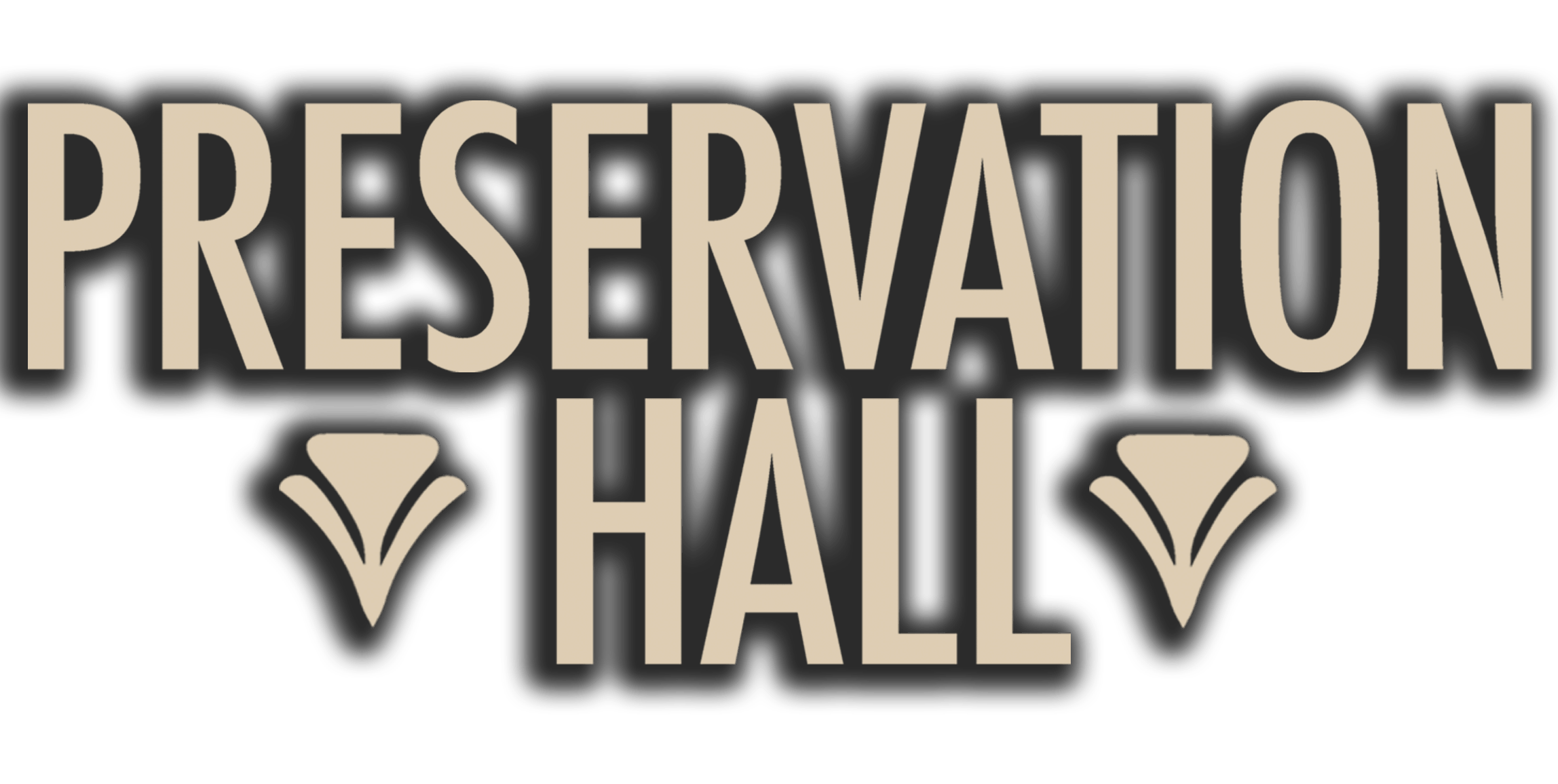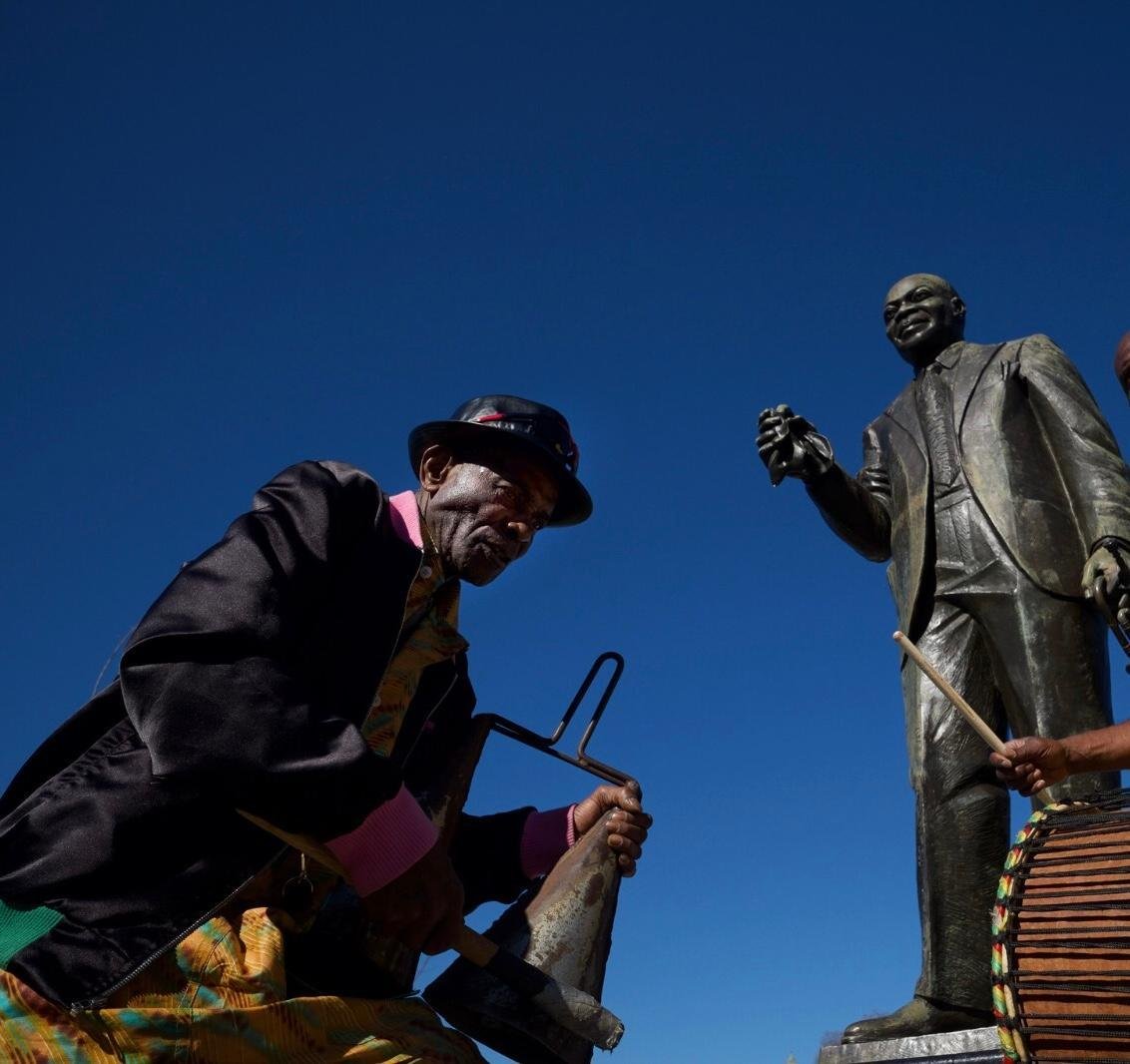MBONGI: Kingdom of Kongo African Dance and Drum Masterclass Series
Papa Titos Sompa leads an Mbongi (Learning) Circle at Preservation Hall in June 2022. Photo by Camille Barnett.
A collective of New Orleans cultural organizations including the Amistad Research Center, Congo Square Preservation Society, New Orleans Jazz Museum, Music Box Village and the Preservation Hall Foundation will present a 12-week education and masterclass series this fall at the historic Toulouse Theatre, offering an interdisciplinary experience in traditional Congolese dance, drum, song, storytelling, and philosophical thought.
Toulouse Theatre
615 Toulouse Street
Saturdays 10am to 12:15pm
Schedule of Masterclasses
November 26, 2022
December 3, 2022
December 10, 2022
December 17, 2022
January 7, 2023
January 14, 2023
January 21, 2023
January 28, 2023
February 4, 2023
February 11, 2023
February 18, 2023
February 25, 2023
10:00am–11:30am
KONGOLESE DANCE AND DRUM MASTERCLASS
11:30am–12 noon
PRESENTATION BY A REPRESENTATIVE FROM A LOCAL ARTS AND CULTURE INSTITUTION ON ACCESSIBILITY, PROGRAMS, EVENTS, OR JOB OPPORTUNITIES
12 noon–12:15pm
Q&A WITH PARTICIPANTS, ARTISTS AND PRESENTERS
Free to participate and open to all ages and skill levels of the general public, the masterclass series aims to increase students’ cultural competency in African and African American history and heritage, and enhance participants’ physical, emotional, spiritual and social awareness.
The courses will be led by Papa Titos Sompa, musician, cultural activist, founder and Artistic Director of the Mbongi Dance Theatre Project, and a native of Brazzaville, Congo; alongside Monique Moss, New Orleans-based cultural historian and scholar, professional dancer and choreographer, curator and Artistic Director of Third Eye Theatre Interdisciplinary and Improvisational Performance Company. The series is funded by a generous grant from the New Orleans Tourism and Cultural Fund.
The Saturday morning events will consist of an African drum and dance masterclass, a presentation by a local cultural partner, and open Q&A session to close the gathering. The courses will employ the spirit of the ancient Kongolese philosophy of the Mbongi Circle – where all members of the community gather as a collective to democratically solve problems – infused by design with community ritual dancing, drumming, and singing. The 12-week series of classes is designed to build bonds and make connections.
“African dance is about opening up your heart and bringing forth the essence of your soul. It is a way of letting go.”
Papa Titos Sompa
Papa Titos Sompa leads an Mbongi Circle at Preservation Hall alongside Monique Moss, in observance of Juneteenth, June 19, 2022. Photo by Camille Barnett.
Mbongi is a Congolese word, which means “Learning Circle.” It refers to the circle of learning in the African village – where people gather to gain understanding about becoming positive, contributing members of the community.
In the African village, problems, issues, questions and concerns of the community, neighbors, and families are examined and solved by the people of the village together through the honest and respectful expression and release of feelings and ideas – and the co-creation of solutions that are most beneficial to the group.
People do this by talking, sharing, dancing, singing, and participating in rituals to mark important transitions. Mbongi is the center of village life – where the members of the community are taught values, personal awareness, self-esteem, concepts of womanhood and manhood, and personal responsibility. Participants learn how to respect each other, their elders, their teachers, and learn of the importance of their inter-generational contribution to a healthy, sustainable community.
The Mbongi or Learning Circle is a sacred space for practice in the art of democratic engagement. The process of experiencing the Mbongi Circle will include focused moments of lecture, discussion, question and answer on topics that examine western cultural and societal moors versus those of African origin – in order to provoke reflection, introspection and ultimately, self-assessment.
It is generally accepted in American history that most enslaved Africans brought to the North American continent were transported from West Africa. While quantitative data indicates West Africa as the primary location of embarkation, examination of those records by scholars prove that captives were from various geographical areas of the African continent, including the vast area of Kingdom of Kongo. This educational arts program is designed to re-invigorate the cultural roots of New Orleans that bind the Kingdom of Kongo to the historic site named after it, Congo Square, where enslaved people gathered in fellowship for over a century.
About Titos Sompa
Titos Sompa, Founder and Artistic Director of Mbongi Dance Theater Project Originating from the Congo (Brazzaville), is a charismatic and extraordinarily gifted performing artist, teacher, and healer. Since arriving in America from Paris, where he taught music and dance and toured Europe with his band, Les Echos Noir, he has inspired artists, students and audiences with his African cultural orientation that holistically integrated music, dance, singing, folklore and spirituality. Sompa was the first to introduce the earthly and fluid Congolese style of simultaneous dancing and singing to America audiences. In the early 1970's, he and lead drummer, Coster Massamba, brought Congolese culture to the New York artistic scene. Sompa founded the first Congolese dance company Tanawa Dance Company in America. He joined the New York dance and theater scene, and performed with James Earl Jones and Ann Miller, along with such jazz greats as Elvin Jones, Eddie Jefferson, Sun Ra, Ron Carter, Leon Thomas, Pharaoh Sanders, Dave Murray, Arthur Blythe, Olu Dara, and Chico Freeman, among others, before relocating in California where he became a magnet for the Congolese artistic community. Over the years he has trained and nurtured numerous Congolese artists. In 1988, Sompa founded Mbongi Dance Theatre Project, a nonprofit corporation dedicated to advancing and celebrating the cultural arts of Africa, especially the music and dance of the Congo. Seeing African culture as a sustaining force, Mr. Sompa has taken on the responsibility of preserving and passing on Congolese culture. His task involves dispelling the ignorance, mythology and distortions about Africa, while he makes known the wisdom, variety, beauty, inspiration, and power of African cultures. Through spirituality, he enables people to tap into the power within and the guidance of our ancestors.
His qualities as a healer, his gentle teaching style that encourages the student to feel communication with self, and his commitment to community building, make Sompa stand out as an artist. He devotes special attention to young people. He designs educational programs, primarily for elementary and high school age students, as well as students of the university, that teach self-esteem, promote values and behaviors that build community awareness, and help them imagine a future.
“It is important that we pay attention to the young people in our community. We need to let them know who they are and where they come from. If they can grab onto it, then they can be the teachers for future generations... We must listen to what our children say to have better communication with them. If we respect one another, then we are able to learn from one another. That is what African teaching is all about.”
Sompa is a powerful messenger with powerful gifts, which he shares through the performing, teaching, producing, and a variety of community-building activities.
About Monique Moss
A native of New Orleans, Monique Moss is a Choreographer, Curator, and Artistic Director of Third Eye Theatre Interdisciplinary and Improvisational Performance Company. She holds a BA in French, MA in Latin American Studies, and MFA in Interdisciplinary Dance Performance from Tulane University, and MA in Museum Studies from Southern University at New Orleans. Moss has worked on local, national and international Dance and Performance Arts projects funded by The Fund for U.S. Artists, Surdna Foundation, Kellogg Foundation, Fulbright-Hays Program, Bill and Melinda Gates Foundation, New Orleans Jazz and Heritage Foundation, Louisiana Division of the Arts, Louisiana Endowment for the Humanities, New Orleans Tourism and Cultural Fund, and Mayor’s Office of Cultural Economy.
Her research conducted in Haiti, Martinique, Guadeloupe, Cuba, France, Spain, Japan, South Africa, and Brazzaville, Kongo, on the history and traditions of New Orleans, has been presented at the River Road African American Museum, Historic New Orleans Collection, New Orleans Jazz Museum, Haitian Studies Association Conference, Latin American Resource Center, New Orleans Council for the Social Studies, Tulane University and Xavier University Institute for Black Catholic Studies.
Her performance works have been presented at the Congo Square New World Rhythms Festival, Magdalena Festival Cali, Colombia, Arts in Society Conference Venice, Italy, MicroFest Hawaii, Kennedy Center, Contemporary Arts Center, Houston Black Dance Festival, Essence Festival, Fringe Festival, New Orleans Film Festival, Prospect+1, 2, 3, NPN Conference, Alternate Roots Festival, Ogden Museum, New Orleans African American Museum, New Orleans Jazz Museum, and the films Silent Parade and Soul Rebels Band Vs. Robert E. Lee, directed by William Cordova as well as City of a Million Dreams, directed by Jason Berry.
Masterclasses taught by Papa Titos Sompa will cover:
Kongolese Dances
Kongolese Drum Rhythms
Kongolese Songs
Kongolese Percussion Instruments
Kongolese History and Culture
Kongolese Mbongi Circle
Presentations by representatives from invited arts and culture organizations and institutions will cover:
Introduction to the Representative
Mission Statement
Accessibility to the Collection and Archive
Programs and Events
Artist Resources and Job Opportunities
This project is funded by a generous grant from the New Orleans Tourism & Cultural Fund. To learn more about NOTCF, visit notcf.com.






